Boxcar Bertha Blu-ray Movie
HomeBoxcar Bertha Blu-ray Movie 
Sandpiper Pictures | 1972 | 88 min | Rated R | Dec 13, 2022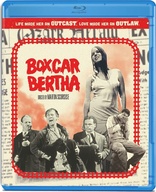
Movie rating
6 | / 10 |
Blu-ray rating
| Users | 0.0 | |
| Reviewer | 3.0 | |
| Overall | 3.0 |
Overview
Boxcar Bertha (1972)
During the depression, a union leader and a young woman become criminals to exact revenge on the management of a railroad.
Starring: Barbara Hershey, David Carradine, Victor Argo, Barry Primus, John CarradineDirector: Martin Scorsese
| Drama | 100% |
| Crime | Insignificant |
| Romance | Insignificant |
Specifications
Video
Video codec: MPEG-4 AVC
Video resolution: 1080p
Aspect ratio: 1.85:1
Original aspect ratio: 1.85:1
Audio
English: DTS-HD Master Audio 2.0
Subtitles
English SDH
Discs
Blu-ray Disc
Single disc (1 BD)
Playback
Region A (B, C untested)
Review
Rating summary
| Movie | 2.5 | |
| Video | 4.0 | |
| Audio | 3.5 | |
| Extras | 0.0 | |
| Overall | 3.0 |
Boxcar Bertha Blu-ray Movie Review
""It's appointed... each man to die. Judgement."
Reviewed by Kenneth Brown December 21, 2023What immediately preceded Martin Scorsese's Mean Streets, the prolific filmmaker's hard-hitting 1973 crime classic that launched the Goodfellas-driven career we know and love today? A little film called Boxcar Bertha (1971), an unlikely Depression-era romantic crime drama produced by none other than Roger Corman. It's an all but forgotten relic that most cinephiles, like me, have probably never heard of, much less seen. It wasn't exactly well received in its day, and it didn't do much to draw attention to Scorsese or show off his chops. But a select few saw something special buried within its low budget capering. Roger Ebert wrote, "Scorsese has gone for mood and atmosphere more than action, and his violence is always blunt and unpleasant, never liberating and exhilarating, as the New Violence is supposed to be. We get the feeling we're inhabiting the dark night of a soul." Ebert's intuition wasn't far off. Today it's clearer than ever what Scorsese had in him, even prior to Mean Streets. Boxcar Bertha remains a flawed, rather inelegant and derivative genre pic, but you can spot the building blocks of the man who would one day go on to give us the likes of Taxi Driver (1976), Raging Bull (1980) and The Departed (2006), just to name a scant few.
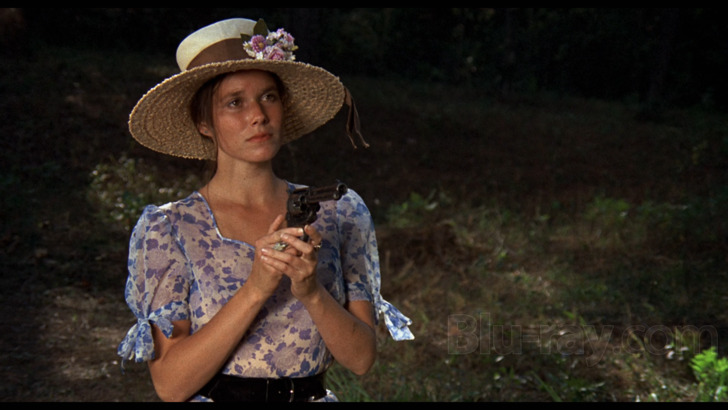
Director Martin Scorsese's second feature film loosely adapts the already loose autobiography of Bertha Thompson, "Sister of the Road", which follows the adventures of a young female criminal following the death of her father. Turning to the tracks for an adolescence of freighthopping, Bertha (Barbara Hershey, 'Hannah and Her Sisters', 'The Right Stuff', 'Black Swan') eventually joins union organizer "Big" Bill Shelly (David Carradine, 'Bound for Glory', 'Kill Bill: Vol. 2') in fighting anti-union forces after an unexpected murder drives them to a life of robbing trains. It isn't long before the two become lovers. What follows is a descent into a life of crime that leads Bertha farther and farther off the righteous path. The film also stars Barry Primus as gambler Rake Brown, Bernie Casey as fellow thief Von Morton, Harry Northup as Deputy Harvey Hall, and John Carradine as Sartoris, along with Victor Argo, David Osterhout and a blink-and-you'll miss him Scorsese as a brothel patron.
Uncle Marty's eye for shooting violence is alive and well, even this early in his career, and his distinct explosivity, though in its infancy, lends Boxcar Bertha's best scenes some welcome power. The screenplay, by co-writers John William and Joyce Hooper Corrington, though, shifts from sequence to sequence in an almost episodic, serialized fashion, making it hard to attach to Bertha or her cohorts. The results are disjointed and disconnected, with Hershey being tasked with stitching it all together. One minute Bertha comes across as a child, young in years and innocent in disposition, but the next minute she's turning to a life of prostitution, without the sequences modern Scorsese would add to make her slide smoother and more emotionally sound. It isn't Hershey's fault by any means -- she does well with what she's given, and there's a sense that the cutting room floor swallowed more of the 90-minute film's connective tissue than should have been allowed -- nor that of her co-stars. It's a problem of narrative clarity and cohesion. The clearest aspect of its script, in fact, is that Corrington and Corrington have drawn far more inspiration from Bonnie and Clyde, which released five years prior in 1967, than "Sister of the Road". You couldn't be faulted for assuming Boxcar Bertha is a B & C rip-off because, well, chances are that's exactly what it is.
Much of what remains hasn't aged well. John Stephens's cinematography is a down-and-dirty shade of ordinary. Gib Guilbeau and Thad Maxwell's music hits the appropriate period notes but is ultimately too generic and too unremarkable. Buzz Feitshans's editing style is... fine. Although I doubt he had much to work with when it came to number of takes, considering the film's budget. But you never know how much you take great editing for granted until you see something "less than" your usual 1970s standard. And the further away from Hershey, Carradine, Casey and Brown you get, the more the chewy dialogue begins to sound as chunky and clunky as it sometimes can be. Corman was a producer who knew how to churn out release after release after release. The consequence, of course, is that many a project was sacrificed to the gods of the short deadline, and Scorsese has never been one to honor their insidious demands. Scorsese is a director -- or at least grew to be a director -- who values the art and cherishes the composition. He loves when a scene feels spontaneous, but his spontaneity is always born from a specific vision. He sees every scene, though he's willing to alter trajectory at a moment's notice. But he's become a master of crafting unpredictability within highly organized blocking, planning and execution. He's a technical wizard with an eye for beauty in what others would consider ugly, and Boxcar Bertha's ragtag production and budget simply couldn't afford him the time to thrive and deliver something as punchy as Mean Streets. Early Scorsese is still much better than other directors' rookie films, but it just doesn't survive the rigors of modern viewing.
Boxcar Bertha Blu-ray Movie, Video Quality 
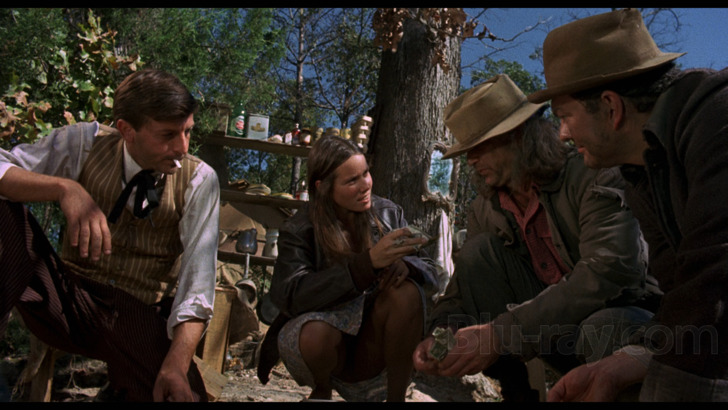
Screenshots can be a tad misleading when it comes to Boxcar Bertha's 1080p/AVC-encoded video presentation, which is presumably identical to the transfer originally released in 2016 by Twilight Time (via a now out-of-print 3,000-copy Limited Edition Blu-ray). Paused and in still shots, the film can look quite striking. Press play, though, and you'll notice a number of issues. Grain has been preserved but is too inconsistent; sometimes harsh, sometimes soft, sometimes spiking aggressively . Black levels also occasionally swarm with faint noise or, to the opposite extreme, prove susceptible to crush. Then there's the bevy of softer shots; most likely traceable to the source elements and original photography, but minor eyesores nonetheless. None of it amounts to a full-fledged disappointment but taken together, some sequences are distracting. Fortunately, the rest of the presentation is competently restored and fairly proficient. Colors are warm and lively, contrast and saturation are dialed in reliably and handsomely, and the palette is teeming with naturally flushed cheeks, bursts of beautiful primaries, and rich earth tones that lend scenes a dust-strewn appearance which only enhances the believability of humble hand-built homes, dingy brothels, dirty train cars and other impoverished locales. Detail is pretty terrific as well, with refined edges (largely free of any artificiality or halos) and exacting fine textures, especially when it comes to faces, skin and clothing fabrics in close-up shots. Better still, I didn't detect any sign of banding, compression limitations or other anomalies. Some print damage pops up from time to time -- blame the less-than-perfect master that was utilized when creating the transfer -- but none of it amounts to anything too frequent or terrible.
Boxcar Bertha Blu-ray Movie, Audio Quality 
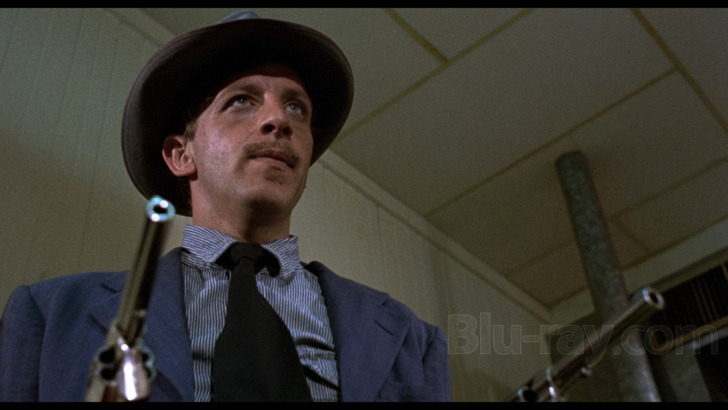
Boxcar Bertha features a DTS-HD Master Audio 2.0 mono track that works well as a restored mix from the early 1970s. Voices are intelligible and clear on the whole and prioritization doesn't allow dialogue to get lost in the violence. Vocal tone is rather thin and tinny at times (blame the original elements) but if anything it only enhances the quaint quality of the low budget film. Similarly, effects and music sound quite good, despite a few instances where the entire mix shows its age. There isn't much at all to sincerely complain about -- consider the source and its era -- and I wouldn't expect much more from a mono track than what we're given.
Boxcar Bertha Blu-ray Movie, Special Features and Extras 
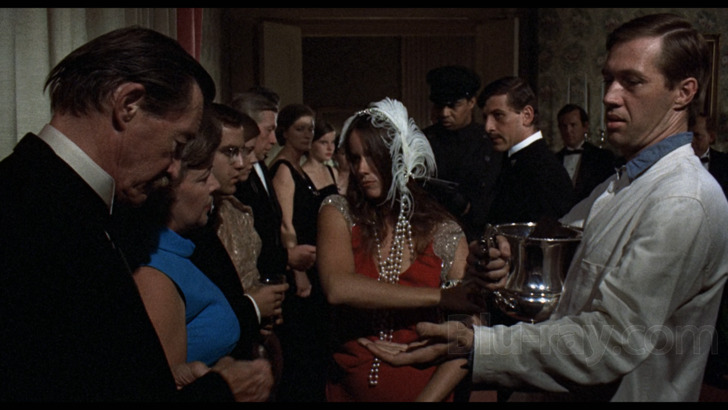
No significant extras are included.
Boxcar Bertha Blu-ray Movie, Overall Score and Recommendation 
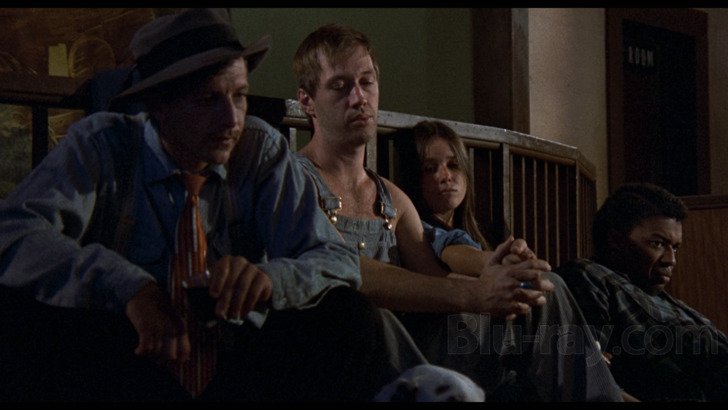
If you're a student at the hallowed University of Scorsese, Boxcar Bertha will be of particular interest to you. Not because it's a great film -- it isn't -- but because so much of what Scorsese develops in the years following its release begin here. Study it to see the building blocks of his art. The dark caper itself doesn't offer much more than that. Sandpiper's Blu-ray release does, though, thanks to a strong video transfer and solid DTS-HD Master Audio mono mix. Neither is perfect but each is more than sufficient to grant Boxcar Bertha new life.
Similar titles
Similar titles you might also like
(Still not reliable for this title)

Thieves Like Us
1974

Welcome to New York
2014

A Touch of Sin
天注定 / Tian zhu ding
2013

Live by Night
2016

No Orchids for Miss Blandish
1948

Ain't Them Bodies Saints
2013

Make Way for Tomorrow
1937

Good Time
2017

They Live by Night
1948

Baadasssss!
How to Get the Man's Foot Outta Your Ass
2003

The Wild Goose Lake
南方车站的聚会 / Nán fāng chē zhàn de jù huì
2019

The Driver
Limited Edition to 3000 - SOLD OUT
1978

The Pay-Off
Losing Game
1930

The Place Beyond the Pines
2012

Born to Win
1971

Blonde Venus
1932

Classe tous risques
The Big Risk
1960

The Panic in Needle Park
Limited Edition to 3000
1971

Aquarius
2016

The Landlord
1970
